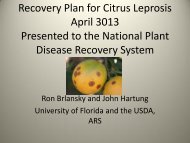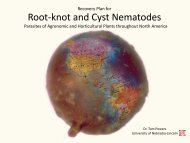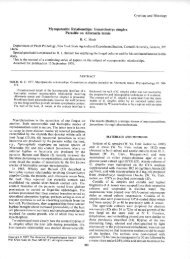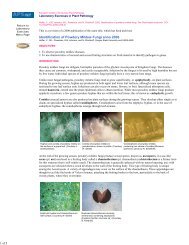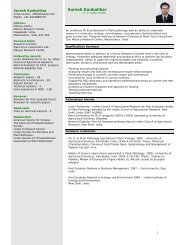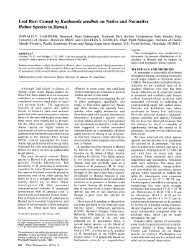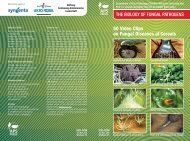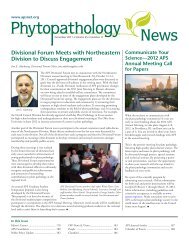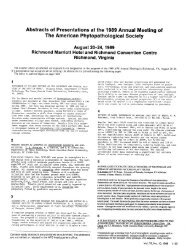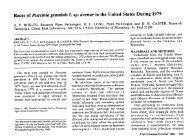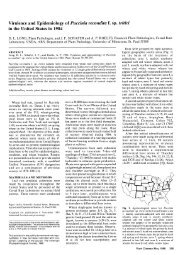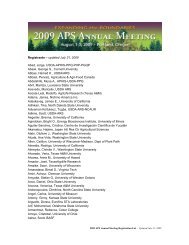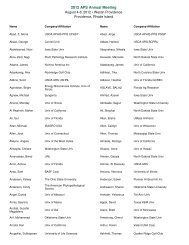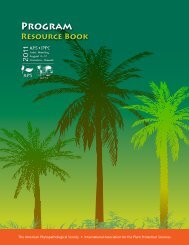Annual Meeting Program Book - American Phytopathological Society
Annual Meeting Program Book - American Phytopathological Society
Annual Meeting Program Book - American Phytopathological Society
You also want an ePaper? Increase the reach of your titles
YUMPU automatically turns print PDFs into web optimized ePapers that Google loves.
sequencing has permitted scientists to quickly and easily sequence<br />
phytopathogen genomes from all domains of life. Our<br />
tool box of new and cost-effective pyrosequencing and microarray<br />
technologies remains a largely untapped resource for<br />
the examination of plant pathogens and soilborne microbial<br />
communities. Furthermore, molecular phytopathologists have<br />
uncovered the biology that underlies pathogenesis through<br />
gene expression analysis using these sequencing technologies<br />
and DNA microarrays. This session highlights the technologies<br />
and research supporting pyro- and high throughput sequencing,<br />
DNA microarrays, and gene expression analysis to communicate<br />
the impact of this knowledge.<br />
1:00 p.m. S-76. Integrating molecular and computational<br />
methods to evaluate the Pseudomonas syringae<br />
transcriptome I. M. FILIATRAULT (1), P. Stodghill<br />
(1). (1) USDA-ARS Plant-Microbe Interactions<br />
Research Unit, Ithaca, NY, U.S.A.<br />
1:30 p.m. S-77. Integrating molecular and computational<br />
methods to evaluate the Pseudomonas syringae<br />
transcriptome II. P. STODGHILL (1), M.<br />
Filiatrault (1). (1) USDA-ARS Plant-Microbe<br />
Interactions Research Unit, Ithaca, NY, U.S.A<br />
2:00 p.m. S-78. Genomic perspectives on plant-associate<br />
enterobacteria. J. D. GLANSER (1). (1) Genome<br />
Center of Wisconsin, University of Wisconsin-<br />
Madison, Madison, WI, U.S.A.<br />
2:30 p.m. S-79. GeoChip: A high throughput genomics<br />
technology for characterizing microbial functional<br />
community structure. J. ZHOU (1). (1) Institute<br />
for Environmental Genomics and Department<br />
of Botany and Microbiology, University of<br />
Oklahoma, Norman, OK, U.S.A.<br />
3:00 p.m. S-80. Comparative and functional genomics<br />
of oomycete infection. B. M. TYLER (1). (1)<br />
Virginia Bioinformatics Institute, Virginia Tech,<br />
Blacksburg, VA, U.S.A.<br />
3:30 p.m. S-81. Comparative genomics, sequence mining<br />
and transcript profiling of cyst nematodes<br />
during plant parasitism. A. A. ELLING (1). (1)<br />
Department of Plant Pathology, Washington State<br />
University, Pullman, WA, U.S.A.<br />
APS-ISF Collaboration to Implement a System to<br />
Standardize Naming of Plant Pathogen Races and Strains<br />
1:00 – 3:30 p.m.; A106<br />
Section: Diseases of Plants<br />
Organizer: Phyllis Himmel, Monsanto Vegetable Seeds,<br />
Woodland, CA, U.S.A.<br />
Moderator: Lindsey du Toit, Washington State University,<br />
Mount Vernon, WA, U.S.A.<br />
Sponsoring Committees: Seed Pathology; Ad Hoc Committee<br />
on Culture Collections; APS-ISF Ad Hoc Committee on<br />
Naming Pathogen Races/Strains<br />
Inconsistency in protocols used to name plant pathogen races<br />
and strains can undermine the value of disease resistance<br />
claims made for specific cultivars, particularly in specialty<br />
crops such as vegetables. A broader understanding of the<br />
impact of naming pathogen races and strains on the vegetable<br />
industry is needed. For example, inconsistencies in naming<br />
of races, pathotypes, and/or strains of the downy mildew<br />
pathogens of spinach and lettuce, as well as the Fusarium wilt<br />
pathogens of tomato, melon, and watermelon, cause continuing<br />
confusion for growers, the vegetable seed industry and<br />
academia. There is no internationally recognized authority on<br />
nomenclature for new races and strains. Readily available sets<br />
of differential host cultivars and reference cultures of pathogen<br />
races and strains are needed to help standardize the nomenclatural<br />
system and provide clarity for claims of disease resistance.<br />
Members of APS, the <strong>American</strong> Seed Trade Association, and<br />
the International Seed Federation are collaborating to implement<br />
a network of private and public research laboratories<br />
and seed companies in the United States for the maintenance,<br />
storage, multiplication, and distribution of reference pathogen<br />
cultures and seed of differential host cultivars, to facilitate<br />
standardizing the naming of plant pathogen races and strains.<br />
The proposed system should complement existing systems in<br />
Europe (i.e., Naktuinbouw in the Netherlands and Group for<br />
Control and Testing Varieties and Seeds - GEVES in France)<br />
and comply with U.S. regulatory requirements. The complexity<br />
and challenges of implementing this system, demand for<br />
such a system, and proposed protocols will be discussed in<br />
the session. Feedback from the APS community is critical to<br />
development of a system of reference pathogen cultures and<br />
differential host sets for naming of pathogen races and strains<br />
with guidelines that are accepted globally by the scientific<br />
community.<br />
1:00 p.m. S-82. Overview of proposed system. P. HIMMEL<br />
(1). (1) Monsanto, Woodland, CA, U.S.A.<br />
1:30 p.m. S-83. Current European systems. C. VAN<br />
ETTEKOVEN (1). (1) Naktuinbouw,<br />
Roelofarendsveen, The Netherlands<br />
2:00 p.m. S-84. Proposed U.S. permitting strategy<br />
for pathogen race and strain distribution.<br />
R. DUNKLE (1). (1) <strong>American</strong> Seed Trade<br />
Association, Alexandria, VA, U.S.A.<br />
2:30 p.m. S-85. Naming of spinach downy mildew races, a<br />
case study. J. C. CORRELL (1), S. T. Koike (2),<br />
S. Smilde (3). (1) Department of Plant Pathology,<br />
University of Arkansas, Fayetteville, AR,<br />
U.S.A.; (2) University of California Cooperative<br />
Extension, Salinas, CA, U.S.A.; (1) University of<br />
Arkansas, Fayetteville, AK, U.S.A.<br />
3:00 p.m. Discussion<br />
Carboxoylic Acid Amide Fungicides (CAA) FRAC Group 40<br />
1:00 – 3:00 p.m.; B110-112<br />
Section: Plant Disease Management<br />
Organizers: Gilberto Olaya, Syngenta Crop Protection, Vero<br />
Beach, FL, U.S.A.; Alex Cochran, Syngenta, Roseville, CA,<br />
U.S.A.<br />
Moderator: Gilberto Olaya, Syngenta Crop Protection, Vero<br />
Beach, FL, U.S.A.<br />
Sponsoring Committees: Chemical Control; Pathogen<br />
Resistance<br />
Financial Sponsor: FRAC<br />
31<br />
MondaY



